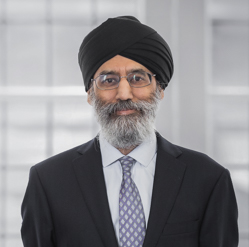Wed, 14 Feb 2018
SM (Algeria) v Entry Clearance Officer, UK Visa Section [2018] UKSC 9
On 23 March 2017 and 29 November 2017, the Supreme Court heard the appeal of SM, a seven-year-old Algerian national who was adopted by French nationals in Algeria under the Kefalah system of Islamic adoption. SM was represented by Ramby de Mello (No5 Barristers' Chambers), Tony Muman, Jessica Smeaton (No5 Barristers' Chambers), and Katie Wilkinson. Manjit Gill QC also of No5 Barristers' Chambers and Navi Ahluwalia intervened in the case on behalf of Coram Children’s Legal Centre (‘CCLC’).
The case
Adoption, as practised in much of the Western world, is prohibited by dictates of Islam. The system of Kefalah is a guardianship model devised by Islamic jurists to accommodate that prohibition.
In January 2012, having been adopted under the Kefalah system, SM applied for entry clearance to the UK under the Immigration (European Economic Area) Regulations 2006 (‘the 2006 Regulations’). She claimed to be either the ‘family member’ (regulation 12(1) of the 2006 Regulations) or the ‘extended family member’ (regulation 12(2) of the 2006 Regulations) of an EEA national. Her adopted father has permanent residence in the UK.
The application was refused by the ECO on the basis that she did not fall within the definition of either a family member or an extended family member; Algeria not being a party to the necessary international covenants on adoptions and adoptions under the kefalah system not being recognised in UK law.
Her appeal was dismissed by the First-tier Tribunal, which found that she did not qualify as either a legal or de facto adopted child under the Immigration Rules, and was not a ‘family member’ or an ‘extended family member’ or adopted child of an EEA national under the 2006 Regulations.
The Upper Tribunal allowed her appeal on the sole basis that she fell within the meaning of ‘extended family member’ under the 2006 Regulations.
The Court of Appeal allowed the ECO’s appeal against that decision on the basis that SM had not been adopted in a manner recognised by UK law. They focused on the issue not of whether SM fell within the definition of a ‘family member’ or ‘extended family member’ under the 2006 Regulations, but whether she was a ‘direct descendant’ within the definition of article 2.2(c) of the Citizens Directive or ‘any other family member…who, in the country from which they have come, are dependants or members of the household of the Union citizen having the primary right of residence’ under article 3.2(a) of the Citizens Directive. They found that she did not fall within either definition.
By the time the case reached the Supreme Court the Upper Tribunal had handed down judgment in Sala (EFMs: Right of Appeal) [2016] UKUT 411; [2017] Imm AR 141, holding that an extended family member has no right of appeal under the 2006 Regulations against the refusal to issue a residence card. The ECO raised this argument against SM in the Supreme Court.
The CCLC, represented by Manjit Gill QC, intervened at this point, as did the Advice on Individual Rights in Europe (‘AIRE’) centre.
The judgment
In respect of both the substantive appeal and the issue of jurisdiction, the Supreme Court found in SM’s favour.
The Court concluded that SM would fall within article 3.2(a) of the Citizens Directive, if she does not fall within article 2.2(c) and that the 2006 Regulations do not appear to properly transpose that Directive. The Court gave a preliminary indication that SM also seemed to fall within article 2.2(c), noting that a failure to recognise ‘Kefalah’ children as direct descendants may discriminate against those who are unable for religious or cultural reasons to accept the concept of adoption as understood in the UK.
It was unable, however, to say that the position on this latter issue was acte clair. Accordingly, the Court referred three questions on this issue to the CJEU for a preliminary ruling.
As to jurisdiction and Sala, the Court made a clear finding that Sala was wrongly decided, approving the decision of the Court of Appeal in Khan v SSHD [2017] EWCA Civ 1755 (in which Ramby de Mello also appeared). The Court noted that the issue had, in any event, been referred to the CJEU in SSHD v Banger [2017] UKUT 125 (unreported) and stated that it ‘shall await with interest the outcome of the reference’ in that case.
An indication from the CJEU on this issue remains vital given that the Immigration (European Economic Area) Regulations 2016 expressly deprive extended family members from a right of appeal.




